Supporting Physical and Cognitive Development: Growing Minds and Bodies
Your child’s physical and cognitive development are the areas of concern that we will focus on first. Understanding how to support these aspects can make a world of difference in their lives.
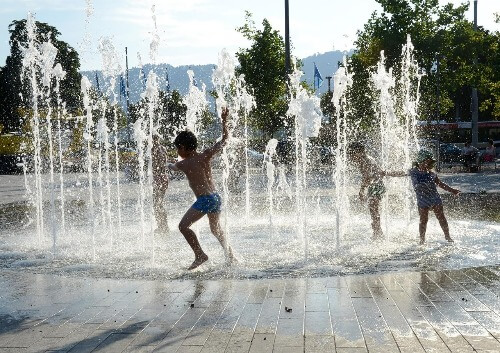 Three young kids running threw water sprinklers at a park.
Three young kids running threw water sprinklers at a park.Understanding a Child's Physical Development
Physical development refers to the growth and strengthening of your child’s body.
Gross motor skills, like walking and jumping or fine motor skills, like writing and buttoning a shirt.
Encourage Active Play
- Outdoor Activities: Ensure your child has lots of time for outdoor play. This includes any type of activity that helps to build strength and coordination, like running, climbing or jump rope.
- Sports: Enroll your child in sports that interest them. Not only will it enhance their physical abilities but it will also teach them teamwork. There are a variety of sports you could include your child in, to name a few, soccer, swimming or gymnastics.
- Dance and Movement: They will improve their balance and flexibility, plus it’s fun. Encourage your child to dance to their favourite songs or join a dance class. Gymnastics is also great for flexibility and coordination.
Promote Healthy Eating Habits
- Balanced Diet: Good nutrition is needed for growth and energy. Provide a diet rich in fruits, vegetables, whole grains, and lean proteins.
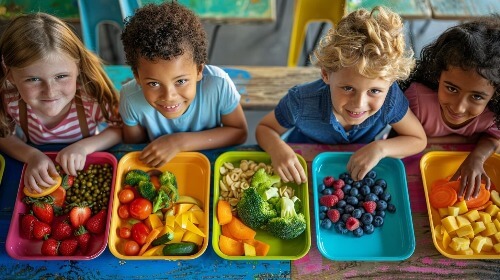 Four young kids eating fruits and vegetables while looking up at the camera and smiling.
Four young kids eating fruits and vegetables while looking up at the camera and smiling.- Hydration: Drinking water is really important for your child’s physical performance and health, so be sure they get plenty of water throughout the day.
- Limit Sugary Snacks: While occasional treats are fine, limit sugary snacks and drinks to prevent obesity and other health issues.
Ensure Adequate Sleep
- Regular Sleep Schedule: Establish a consistent bedtime routine. Children need 9-12 hours of sleep per night, depending on their age.
- Calm Environment: Create a quiet and dark environment for sleeping. Limit screen time before bed to promote better sleep quality.
Nurturing Cognitive Development
Cognitive development involves the growth of a child’s brain and their ability to think, learn, and solve problems.
Here are some effective strategies to support your child’s cognitive development:
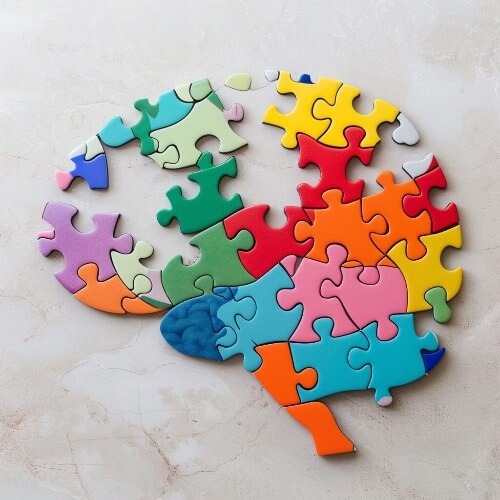
Stimulate Curiosity and Learning
- Reading Together: Make reading a daily habit. Read to them or have them read to you when they are ready. Afterword, talk about the stories you just read together.
- Educational Games and Puzzles: Provide them with fun and interesting games and puzzles, like building blocks, jigsaw puzzles or board games. This will help with their thinking and problem-solving skills.
- Ask Questions: Engage your child in conversations that stimulate their curiosity. Ask open-ended questions that encourage them to think before answering and express their thoughts.
Encourage Creative Expression
- Arts and Crafts: Provide materials for drawing, painting, and crafting. This will help them to develop fine motor skills as well as express themselves creatively.
- Music and Drama: Encourage participation in music and drama activities. When your child can play an instrument or act, they build confidence in themselves and boost their cognitive skills.
- Imaginative Play: Support imaginative play by providing costumes, props, and opportunities for role-playing, promoting cognitive and social skills
Foster a Love for Learning
- Positive Reinforcement: Praise your child’s efforts and achievements in learning, to build confidence and motivation.
- Explore Interests: Strengthen their love of learning by exploring topics of interest, like science, history or nature.
- Educational Outings: To make learning more exciting, you could take trips to museums, zoos, and other educational places.
Social and Emotional Development is Just as Important as Physical and Cognitive Development
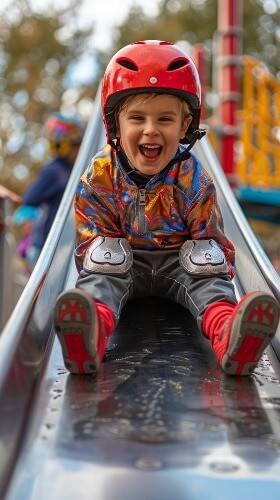 Young boy sliding down a metal slide in the park, laughing with joy and wearing a helmet and knee pads.
Young boy sliding down a metal slide in the park, laughing with joy and wearing a helmet and knee pads.It’s not all just about your child’s physical and cognitive development, it’s also a requirement that you take care of your child’s social and emotional growth.
A well-rounded approach ensures your child is not only smart and strong but also emotionally intelligent and resilient.
Building Social Skills
Playdates: Arrange playdates with peers to help your child develop social skills.
Your kids will learn sharing, cooperation and empathy when they play with other children.
Group Activities: Encourage participation in group activities like clubs, sports teams, or community events, in order to build teamwork and communication skills.
Modeling Behavior: Be a positive role model. As you know children are always watching you and copying you.
So you need to show kindness and patience to others.
Emotional Support
- Open Communication: Maintain open lines of communication, by allowing your children to talk to you about their feelings and concerns.
- Teach Emotional Regulation: Children will better understand emotions when you teach them techniques like deep breathing, counting to ten, or talking about their feelings.
- Provide a Safe Environment: So that they can feel secure enough to explore and learn effectively, you need to create a safe and supportive home environment.
Integrating Technology Wisely
In today’s digital age, technology plays a significant role in a child’s physical and cognitive development.
Here’s how to use it wisely:
Educational Apps and Programs
- Screen Time Limits: Set limits on screen time to ensure a healthy balance between digital and physical activities.
- Quality Content: Choose educational apps and programs that promote learning and creativity. Look for anything that is age-appropriate and interests them.
- Interactive Learning: Use technology for interactive learning experiences. Virtual field trips, online tutorials, and educational games can complement traditional learning methods.
Balancing Tech and Real-Life Activities
- Tech-Free Zones: Establish tech-free zones and times, like during meals or before bed, to encourage family interaction and relaxation.
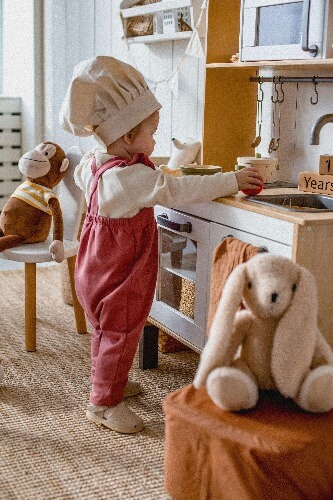 Young toddler wearing a chef's hat playing in a pretend kitchen. There is a stuffed bunny and a stuffed monkey in the chairs near her.
Young toddler wearing a chef's hat playing in a pretend kitchen. There is a stuffed bunny and a stuffed monkey in the chairs near her.Active Tech Use: Encourage active rather than passive use of technology.
For example, use apps that require movement, like dance games or interactive learning activities
Monitor Content: Keep an eye on what your child is accessing online. Ensure it’s safe, educational, and appropriate for their age.
__________________________
A child’s physical and cognitive development involves active participation and thoughtful strategies.
It’s up to you to encourage play, healthy eating and adequate sleep for their physical growth.
And for their cognitive development motivate them to have a love for learning and creative expression.
As you support your child’s physical and cognitive development, remember that your involvement, encouragement, and love are the most significant factors in helping them thrive.








































New! Comments
Have your say about what you just read! Leave me a comment in the box below.